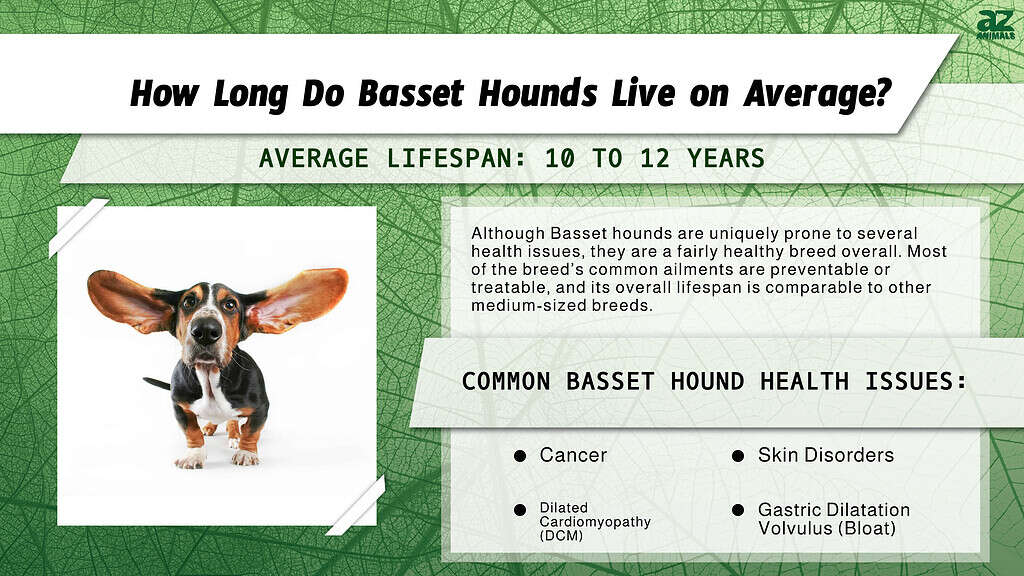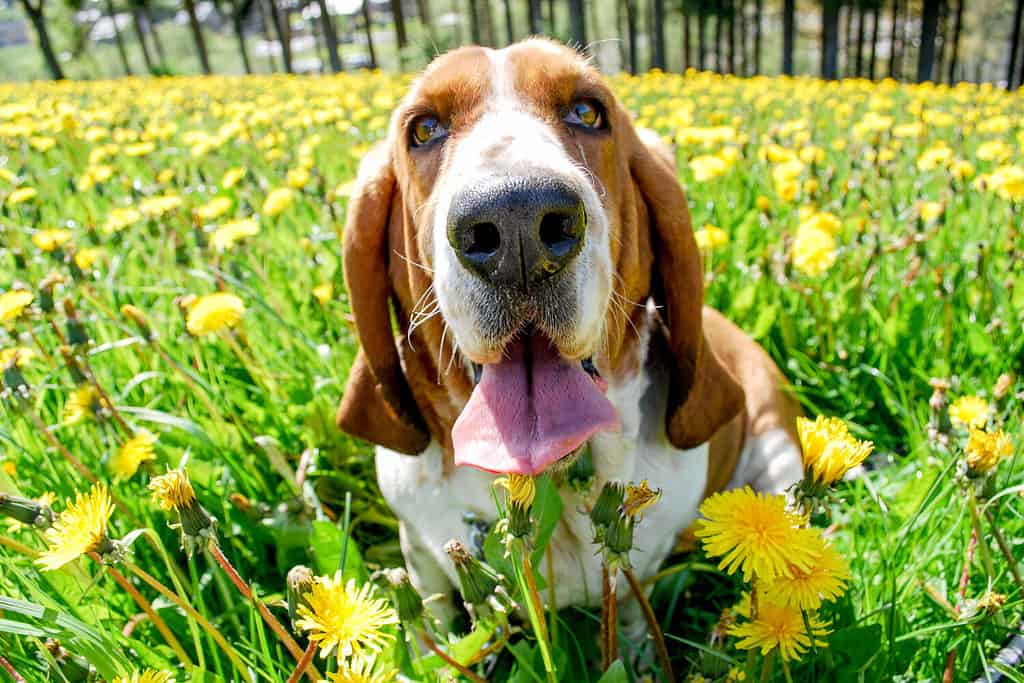Short and squat with long ears and folds upon folds of loose skin, the Basset hound is a uniquely adorable breed beloved by dog owners worldwide. Although they were originally bred for hunting thanks to their incredible sense of smell, they’ve since become popular as pets for their silly appearance and playful–if sometimes stubborn–temperaments. But how long is the lovable Basset hound’s lifespan, and what kinds of health issues do they commonly experience? Read on to learn more, as well as some tips for how you can ensure your droopy-eyed pup lives up to its full potential.
How Long Do Basset Hounds Live On Average?

The Basset hound’s lifespan is typical for a medium-sized breed.
©Bill Anastasiou/Shutterstock.com
The average Basset hound usually lives for around 10 to 12 years. Currently, the median lifespan of Basset hounds in France is 10.3 years, while it is slightly higher in the UK at 11.3 years overall.
However, this can vary somewhat, with some Basset hounds living well beyond this estimate. For example, a 2004 UK Kennel Club survey of more than 140 deceased Basset hounds recorded at least one individual living to 16.7 years. With proper care, regular veterinary examinations, a healthy diet, and exercise, it is common for Bassets to live well beyond the breed’s median life expectancy.
In general, the Basset Hound’s lifespan is typical for a medium-sized dog breed that commonly weighs in at around 45 to 75 pounds. Still, several health issues commonly affect its lifespan as a pure breed, which we’ll cover in more detail below.

What Health Issues Affect Basset Hounds’ Lifespans?

The Basset hound’s adorably droopy skin and eyes are prone to infections, though these conditions are mostly minor and treatable.
©Daniel Myjones/Shutterstock.com
As with most purebred dogs, the Basset hound’s lifespan is impacted by a wide range of health issues that more commonly affect certain breeds. As far as life-threatening conditions go, issues like bloat (also known as gastric dilatation and volvulus), dilated cardiomyopathy (DCM), and cancer are the most common causes of death in the breed.
Gastric Dilatation Volvulus (Bloat)
Most commonly known simply as bloat or GDV, this condition is most commonly caused by dogs eating too much too quickly. Large amounts of food and gas cause the dog’s stomach to expand rapidly, resulting in several life-threatening side effects. For example, blood flow can be cut off from the stomach, the stomach wall can rupture, and increased pressure on the lungs can make breathing difficult.
Most troublingly, the condition can cause the affected dog’s stomach to twist and rotate. In turn, cell death can occur in the GI tract, as well as the kidneys and liver. It can also result in sepsis as bacteria from the GI tract gain access to the bloodstream.
This condition progresses rapidly and can become deadly quickly, meaning it requires immediate medical attention to treat. It is most common in breeds with large, deep chests, like the Basset hound, Great Dane, and standard poodle. Symptoms include rapid, shallow breathing, attempting to vomit, restlessness and anxiety, an increased heart rate, an enlarged abdomen, and a cold body temperature.
Dilated Cardiomyopathy (DCM)
Another health issue that often kills Basset hounds is dilated cardiomyopathy or DCM. This disease primarily affects the heart, causing it to become enlarged and its normally thick muscular walls to become much thinner and strained under increased pressure. Essentially, the affected dog’s heart becomes so large and weak that it results in heart failure.
This disease is common in medium-to-large breed dogs, including the Basset hound, as well as the Doberman Pinscher, Cocker Spaniel, and Great Dane. Its causes are uncertain and have been the subject of heavy debate over the years, from genetic predisposition to dietary deficiencies and even certain infections.
Dilated cardiomyopathy can begin gradually, or its onset can be more sudden. Symptoms include rapid or strained breathing, weakness, loss of appetite, coughing and gagging, fainting, and a bloated or distended belly.
Cancer
One of the most common killers of Basset hounds is cancer, most frequently cancers like lymphoma or squamous cell carcinoma. According to the aforementioned 2004 UK Kennel Club survey, around 31% of the 142 deceased dogs involved died from cancer.
Certain breeds are uniquely prone to lymphoma, such as the Basset hound, Cocker Spaniel, and Boxer. Unfortunately, the direct causes of this particular cancer are still unknown and often subject to heavy debate. It primarily affects the lymphatic system, which is responsible for filtering the blood, transporting white blood cells and proteins, and producing important antibodies that help protect your dog from viruses and bacteria.
Symptoms of lymphoma include loss of appetite, lethargic behavior, swelling of the legs and face, weight loss, and increased thirst.
Squamous cell carcinoma, meanwhile, is also common in Basset hounds, as well as breeds like the Bloodhound, Standard Poodle, and Schnauzer. This type of skin cancer essentially presents as a tumor of skin cells. These tumors can initially be difficult to spot on dogs like Bassets and bloodhounds due to their excess skin folds. Like most other cancers, the causes are largely unknown.
Symptoms of squamous cell carcinoma include small, firm bumps on the skin, or nodules, reddish, scaly bumps on the skin, or raised, brown, wart-like spots. They can also sometimes present as open sores.
Other Common Health Issues That Impact Basset Hound Lifespans

Basset hounds are also prone to arthritis and obesity due to their short stature and low-energy temperaments.
©praneem79/Shutterstock.com
While the above health issues are the most common direct causes of death in Basset hounds, numerous other less severe conditions are also prevalent in the breed. These health issues, while not directly lethal, can still impact your Basset hound’s lifespan and overall quality of life.
The most common of these health issues include skin disorders like seborrhea, yeast infections, eye and ear issues like infections, third eyelid gland prolapse (also known as cherry eye), obesity, and arthritis.
Skin infections are especially common thanks to the breed’s many folds of loose, hanging skin. As with the aforementioned squamous cell carcinomas, these infections can initially be difficult to spot and identify, as they often form within the dog’s skin folds. The breed’s long, droopy ears are also especially susceptible to infections and require frequent cleanings.
The Basset’s similarly droopy eyes, while adorable, also come with predispositions to certain health issues. The most notable and breed-specific is prolapse of the third eyelid gland, or cherry eye, where a red, raised bump of prolapsed tissue becomes visible in the corner of the eye near the tear duct. This most commonly occurs in puppies, and its causes are unknown. Treatments include ointments to minimize swelling and surgery to treat the prolapse.
Finally, obesity and arthritis are common in Basset hounds due to the breed’s short stature and sedentary behavior. Fortunately, it is possible to prevent these issues to an extent with a healthy diet and frequent exercise, as well as regular veterinary exams.
How To Extend Your Basset Hound’s Lifespan

Ideally, your Basset hound should see a vet at least once per year. However, puppies need to be examined more frequently.
©Jne Valokuvaus/Shutterstock.com
Although Basset hounds are uniquely prone to several health issues, they are a fairly healthy breed overall. Most of the breed’s common ailments are preventable or treatable, and its overall lifespan is comparable to other medium-sized breeds.
To lengthen your Basset hound’s lifespan as much as possible, you must take your pup to see a vet at least once to twice per year. Keep in mind puppies should see a vet more frequently, as this life stage is crucial to your dog’s development. If your dog presents any troubling symptoms, you should bring these to your vet’s attention immediately.
Additionally, a healthy diet and regular exercise are especially critical to your Basset hound’s health. A diet rich in animal protein, carbohydrates, and fats is essential. Because the breed has such a short and stout build, it is prone to becoming overweight or even obese.
Furthermore, the Basset hound’s low-energy, somewhat stubborn nature can make getting regular exercise more challenging compared to other dog breeds. Still, it is important to keep your pup well-exercised as well as physically and mentally stimulated. By combining proper preventative care with regular veterinary check-ups, your floppy-eared friend will live up to their full potential!
The photo featured at the top of this post is © Daniel Myjones/Shutterstock.com
Ready to discover the top 10 cutest dog breeds in the entire world?
How about the fastest dogs, the largest dogs and those that are -- quite frankly -- just the kindest dogs on the planet? Each day, AZ Animals sends out lists just like this to our thousands of email subscribers. And the best part? It's FREE. Join today by entering your email below.
Thank you for reading! Have some feedback for us? Contact the AZ Animals editorial team.







